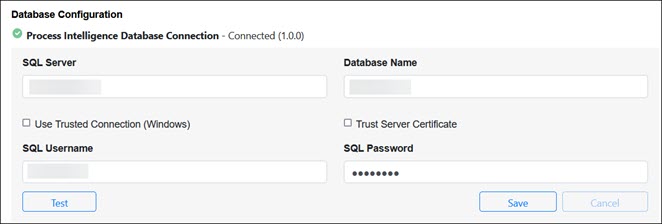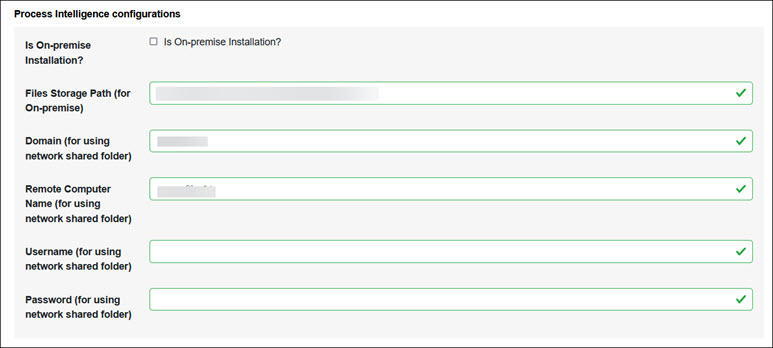Configuring a Process Intelligence Database in the Worksoft Portal
In the Worksoft Portal, you must complete the following tasks:
- Register Process Intelligence.
- Set up your database security configuration.
- Configure network and on-premise environments
You can access the Worksoft Portal through the following URL address:
https://servername.worksoft.com/portal
Registering Process Intelligence
The first time an administrator signs in to Process Intelligence through the URL address, Process Intelligence registers automatically in the Worksoft Portal.
From the Worksoft Portal menu, select Product Configuration > Process Intelligence to verify the registration.

Do not sign in the first time with the localhost because it will register as the localhost, which will cause problems. If this happens, click the Deregister button, sign in through the URL address, and register Certify Results Exporter again.
If the product does not automatically register, you can trigger the registration manually. For more information, see Manually Registering Products and Services for the Worksoft Portal.
Database Connection Configuration Options
When you configure your Process Intelligence database, you can select how you want to set up your database security configuration. You need to be a superuser to configure both connections:
- User Based Configuration
- Managed Service Identity Configuration
To set up a Process Intelligence database with a user-based configuration connection:
-
From the Worksoft Portal menu, select Product Configuration > Process Intelligence.
The Database Configuration page opens.

-
Select the User Based Configuration option.
- In the SQL Server field, enter the server name.
- In the Database Name field, enter the database name.
-
If you want to use Windows authentication, select the Use Trusted Connection (Windows) option.
For more information about configuring Windows authentication, see Chapter 2 in the Worksoft Infrastructure Services Installation Guide.
-
If you want to use SQL Server authentication, enter the SQL Server user name and password in the respective fields.
-
Select the Trust Server Certificate option.
-
Click Test to test your database connection.
A message opens stating if the connection was successful or failed. If the test fails, troubleshoot the database connection.
- Click OK to close the message.
-
Click Save to save your database.
A message opens stating the connection was successful.
To set up a Process Intelligence database with a Managed Service Identity configuration connection:
-
From the Worksoft Portal menu, select Product Configuration > Process Intelligence.
The Database Configuration page opens.

-
Select the Managed Service Identity Configuration option.
- In the Database Server field, enter the server name.
- In the Database Name field, enter the database name.
- In the Managed Identity ID field, enter the ID.
-
Click Test to test your database connection.
A message opens stating if the connection was successful or failed. If the test fails, troubleshoot the database connection.
- Click OK to close the message.
-
Click Save to save your database.
A message opens stating the connection was successful.
Configuring Network and On-Premise Environments
You can also configure the Process Intelligence environment in the Worksoft Portal. You can select to configure your environment to a network or an on-premise environment.

To configure a network environment:
- Scroll down the Process Intelligence page in the Worksoft Portal to the Process Intelligence Configurations section.
-
In the Process Intelligence Configurations section, enter the following information:
Parameter
Description
Domain
Enter the domain name for the shared folder.
Remote Computer Name
Enter the name of your remote computer for using the network shared folder.
Username
Enter the username for using the network shared folder.
Password
Enter the password for using the network shared folder.
The configuration is complete.
To configure an on-premise environment:
- Scroll down the Process Intelligence page in the Worksoft Portal to the Process Intelligence Configurations section.
- In the Process Intelligence Configurations section, select the Is On-premise Installation? option.
-
In the File Storage Path field, enter the file path where you intend to store your files.
The configuration is complete.